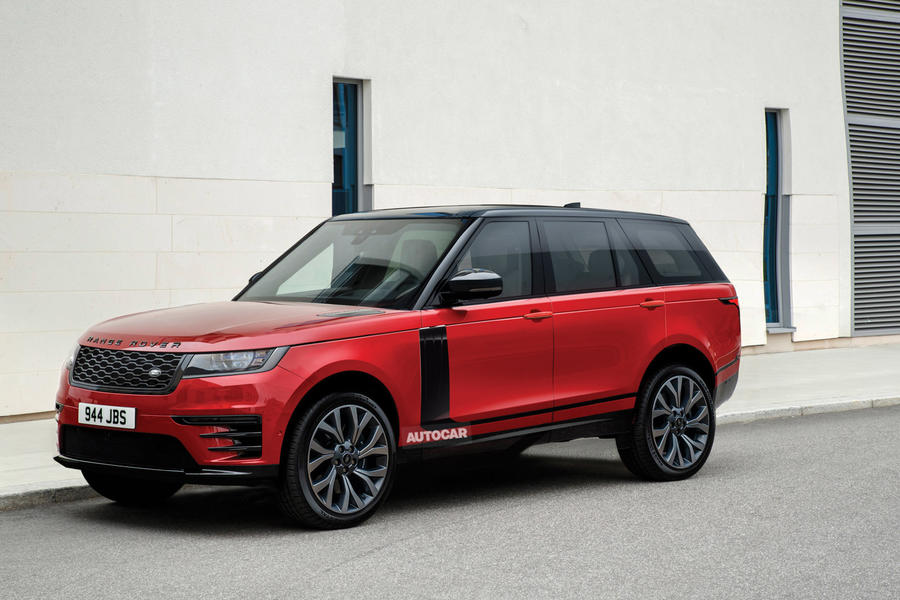Jaguar Land Rover project aims for hydrogen SUVs by 2030
Project Zeus could see a hydrogen-fuelled Range Rover make production later this decade
Jaguar Land Rover (JLR) is embarking on a serious hydrogen power research project with the aim of developing fuel cell-powered versions of its larger vehicles.
Should the research effort – which is known as Project Zeus – prove successful, the fuel cell technology would most likely be ready for production use around the time of the next-generation Range Rover Evoque’s arrival in the middle of the 2020s and then be used for zero-emissions versions of larger models in the future.
The British firm is currently working on several battery electric vehicles (BEVs) to join the existing Jaguar I-Pace, including a new Jaguar XJ. However, the hydrogen project could give it another powertrain option as the British government’s plan to ban the sale of internal combustion-engined vehicles by 2035 or sooner approaches.
Project Zeus was described by JLR product engineering chief Nick Rogers in a recent online event as “really, really important”. He added that the company will soon reveal a driveable hydrogen fuel cell concept car.

Hydrogen power could also be a strong option in regions and countries with limited BEV charging infrastructures where rugged off-roaders are popular.
While Jaguar could also use the technology for its future models, possibly including the next-generation F-Pace SUV, it’s likely to focus on battery-electric propulsion, given its cars’ generally smaller size and greater road bias than Land Rovers.

Notably, JLR’s plans are similar to those of BMW, which is planning to put an X5-based i Hydrogen Next SUV (which would rival JLR’s Evoque-sized hydrogen model) into limited production in 2022, with plans to follow it with larger hydrogen models based on the X6 and X7.
The timeframe for the start of the proposed UK ban on new ICE car sales, and similar plans in other countries, means JLR has no choice but to start now on a new zero-emissions strategy. This is particularly key for JLR, because most of its output is larger, heavier luxury vehicles, which are challenging to reinvent as battery-electric vehicles, given their weight and longer range requirements.
Rogers said: “Hydrogen is an ideal application for the bigger vehicles [in our line-up], because the bigger the car, you get diminishing returns [when using] battery packs. The amount of energy you can store in a battery for a given amount of weight means you’re in a position where you’re making the cars that are so heavy, they’re using [a lot] of energy just to cart that heavy weight about.”
Project Zeus was revealed earlier this year, when the government announced that it would invest £73 million in ‘seeding’ various automotive projects to reduce CO2 emissions. JLR will work with Delta Motorsport, Marelli Automotive Systems and the UK Battery Industrialisation Centre on its hydrogen project.

According to the Advanced Propulsion Centre, which issued the funding, the JLR-led project “will deliver a zero-tailpipe-emissions premium fuel cell SUV concept with Jaguar Land Rover attributes, such as long range, quick refill, towing, off-road capabilities and low-temperature performance”.
JLR hired Ralph Clague as its new hydrogen and fuel cells chief in March 2019. Clague had been director of fuel cell research and development at Chinese manufacturer Great Wall since 2016. Autocar also understands that JLR was trying to recruit more hydrogen engineers early this year.
JLR’s entry into hydrogen research comes as there’s a huge resurgence of interest and investment in the fuel, with numerous projects to manufacture ‘green’ hydrogen being announced across Europe in the past few months.
The government recently established the Hydrogen Advisory Council “to inform the development of hydrogen as a strategic decarbonised energy carrier for the UK”.
Much of the world’s hydrogen production is currently achieved by extracting it from natural gas, a process known as reforming. This can’t be regarded as ‘zero-carbon’, because the hydrogen comes from fossil fuels.
However, hydrogen can also be created by using renewable electricity (from wind turbines, for example) to ‘crack’ seawater into hydrogen and oxygen through a process called electrolysis.
According to recent research by forecasting specialist IHS Markit, “costs for producing green hydrogen have fallen by 50% since 2015 and could be reduced by an additional 30% by 2025, due to the benefits of increased scale and more standardised manufacturing, among other factors”.
IHS Markit also noted that investment in hydrogen cracking is set to expand massively over the next few years, saying: “Economies of scale are a primary driver for green hydrogen’s growing cost competitiveness. The average size for ‘power-to-x’ projects scheduled for 2023 is 100MW – 10 times the capacity of the largest project in operation today.”

Despite all the faith laid in the improvement in EV battery power and storage, there has been a rapid shift in thinking across European governments.
https://www.autocar.co.uk/car-news/new-cars/jaguar-land-rover-project-aims-hydrogen-suvs-2030
Jaguar Land Rover project aims for hydrogen SUVs by 2030 | Autocar
Project Zeus could see a hydrogen-fuelled Range Rover make production later this decade
www.autocar.co.uk
'Fuel Cell' 카테고리의 다른 글
| Mahle develops off-the-shelf air filter for hydrogen powertrains (0) | 2020.08.20 |
|---|---|
| MTU Teams with DLR To Advance Hydrogen Fuel Cells (0) | 2020.08.19 |
| Tesla Model 3 Is The Top-Selling EV In South Korea (0) | 2020.08.19 |
| Could Bloom fuel cells be a solution for maritime emissions issues? (0) | 2020.08.19 |
| New Range Rover Evoque Could Be A Game-Changer (0) | 2020.08.18 |


